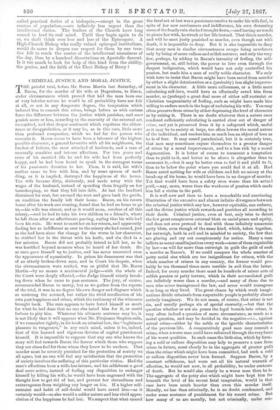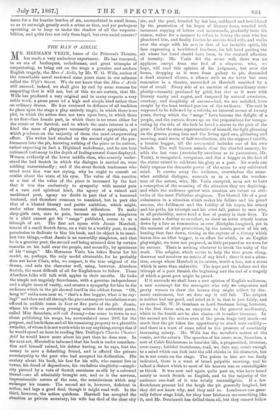CRIMINAL JUSTICE AND MORAL JUSTICE.
THE painful trial, before Mr. Baron Martin last Saturday, of Bacon, for the murder of his wife at Dagenham, in Essex, under circumstances which proved that had the man been one of very inferior nature he would in all probability have not felt at all, or not in any dangerous degree, the temptation which induced him to commit this crime, brings before us with curious force the difference between the justice which punishes, and must punish more or less, according to the enormity of the external act committed, and that deeper sentiment which regulates the abhor- rence or disappiobation, or it may be, as in this case, little more than profound compassion, which we feel for the person who commits it. Bacon seems to have been a labourer of the highest possible character, a general favourite with all his neighbours, the fondest of fathers, the most attached of husbands, and a man of unusually sensitive and intense affections. For two years and more of his married life he and his wife hal been perfectly happy, and he had been heard to speak in the strongest terms of his passionate devotion to her. Then, it is said, his wife's mother came to live with him, and by some system of med- dling, as it is implied, destroyed the happiness of the house. The wife became dirty, slatternly, and made away with the wages of the husband, instead of spending them frugally on her housekeeping, so that they fell into debt. At last the landlord distrained for rent, but excused the rent and gave back the goods, on condition the family left their home. Bacon, on his return home after his work one evening, found that he had no home to go to,—his wife was absent, and as it would seem, careless of all this misery,—and he had to take his two children to a friend's, where he left them after an affectionate parting, saying that his wife had been his ruin. He went to meet her on her return, and apparently finding her as indifferent as ever to the misery she had caused, just as she had been since the change for the worse in her character, he stabbed her in the throat with his knife, and she died in a few minutes. Bacon did not probably intend to kill her, as he was horrified beyond measure when he heard of her death. He at once gave himself up to justice, and 'has never recovered even the appearance of equanimity. In prison his demeanour was that of an utterly broken-down man, and in Court his despair, when the circumstances were recited, was so pitiful that Mr. Baron Martin—by no means a sentimental judge—with the whole of the Court were deeply affected,—the Judge himself utterly break- ing down when he came to pass sentence. The jury, of course, recommended Bacon to mercy, but as we gather from the reports of the trial, it was in no degree his own danger and disgrace which so unstrung the accused, but rather the vivid recollection of his own past happiness and crime, which the testimony of the witnesses brought back. The man appears to have hated himself so much for what he had done that no one else hated him for it, or could forbear to pity him. Whatever his ultimate sentence may be, it is not likely that it will appease what Mr. Fitzjames Stephen calls, if we remember rightly, in his book on criminal Law, the "legitimate pleasure in vengeance," in any one's mind, unless it be, indeed, that of this learned and vigorous devotee of capital punishment himself. It is impossible to suppose that any one who knows the story will feel towards Bacon the horror which those who suppose they are clean feel for those whom they know to be unclean. That murder must be severely punished for the protection of society we all agree, but no one will feel any satisfaction that the protection of society involves the suffering of this particular victim. Had the man's affections been a trifle less intense, and his selfishness a good deal more active, instead of feeling any disposition to endanger himself by killing his wife, he would have been engrossed with the thought how to get rid of her, and prevent her slovenliness and extravagance from weighing any longer on him. If a higher self- restraint and habit of self-denial would have saved him—as it certainly would—so also would a colder nature and less vivid appre- ciation of the happiness he had lost. We suspect that what caused the fatal act at last was a passionate resolve to make his wife feel, in spite of her new carelessness and indifference, his own devouring sense of the family ruin she had brought down,—and having no words to pierce her with, he struck at her life instead. That this is murder, and will be most justly punished as murder, even though not with death, it is impossible to deny. But it is also impossible to deny that many men in similar circumstances escape being murderers only by being of more callous and selfish natures; and only the very few, perhaps, by adding to Bacon's intensity of feeling, the self- government, or, still better, the power to love even through the deepest indignation, which would have not only controlled his passion, but made him a man of really noble character. We only wish here to insist that Bacon might have been saved from murder by either a slight deterioration or a (probably) less slight improve- ment in his character. A little more callousness, or a little more calculating self-love, would have as effectually saved him from murder, as (perhaps) a great deal more of either self-restraint or Christian magnanimity of feeling, such as might have made him willing to endure much in the hope of reclaiming his wife. You may often preserve from crime by either depressing the level of character or by raising it. There is no doubt whatever that a nature once rendered sufficiently calculating is carried clear out of- danger of crime, and yet is preserved from it by a safeguard which, useful as it may be to society at large, too often lowers the moral nature of the individual, and renders him as much less an object of love as he is of fear. It may sound paradoxical, but it is certainly true, that men may sometimes expose themselves to a greater danger of crime by a moral improvement, and to a less risk by a moral degeneration. It is better of course to surmount a temptation than to yield to it, and better to be above it altogether than to surmount it,—but it may be better even to feel it and yield to it, than to be below the point where you could feel it at all. Had Bacon cared nothing for wife or children and felt no misery at the break-up of his home, he would have been in no danger of murder. Yet that would have been a safety even worse than his actual peril,—nay, more, worse than the weakness of passion which made him fall a victim to the peril.
It is well now and then to have a remarkable and convincing illustration of the excessive and almost infinite divergence between the criminal justice which any law, however equitable, can enforce, and the divine justice which rewards and punishes all according to their deeds. Criminal justice, even at best, only tries to detect the few great conspicuous external blots on social peace and equity, and does not even pretend to deal with those infinitely numerous petty blots, even though of the same kind, which, taken together, far outweigh, both in evil and in mischief to society, the few that are glaring and cry out conspicuously for notice. Many a man inflicts as many small injustices every week—none of them cognizable by law—as will far more than outweigh in guilt the guilt of such a murder as Bacon's. If we could compare the whole number of petty social sins which are too insignificant for crimes, with the whole number of crimes in any country, the former would pro- bably be ten thousand times more terrible in evil than the latter. Indeed, for every murder there must be hundreds of minor acts of selfish passion or petty torture, which in their accumulated guilt are infinitely worse than a murder,—and many of these due to men who never transgressed the law, and never would transgress it as long as they lived. The great chasm by which weak imagi- nations divide criminals from respectable people is probably almost entirely imaginary. We do not mean, of course, that crime is not sin, and usually perhaps sin of special enormity,—but that the question whether or not sin passes the legal bounds into crime, is very often indeed a question of mere circumstance, as much as a moral question, and may be decided in the negative—i.e., against actual crime—either by the noble or the ignoble characteristics of the previous life. A comparatively good man may commit a crime, when aworse man could have refrained through the very force of his worst qualities. In such cases the little sins, which by form- ing a cold or callous disposition may help to preserve a man from crime in future, must clearly be in the aggregate of greater guilt than the crime which might have been committed, had such a cold or callous disposition never been formed. Suppose Bacon, by a constant selfishness, had worn out all his natural warmth of affection, he would not now, in all probability, be under sentence of death. But he would also clearly be a worse man than he is. The aggregate of the petty sins which might have kept him far beneath the level of his recent fatal temptation, would in that case have been much heavier than even this murder itself. Morally, no less than criminally, he is no doubt condemned, and under some sentence of punishment for his recent crime. But how many of us are morally, but not criminally, under sen.-
tence for a far heavier burden of sin, accumulated in small items, so as to outweigh greatly such a crime as that, and yet perhaps so operating as to keep us under the shadow of all the respecta- bilities, and quite free not only from legal, but even social censure?































 Previous page
Previous page